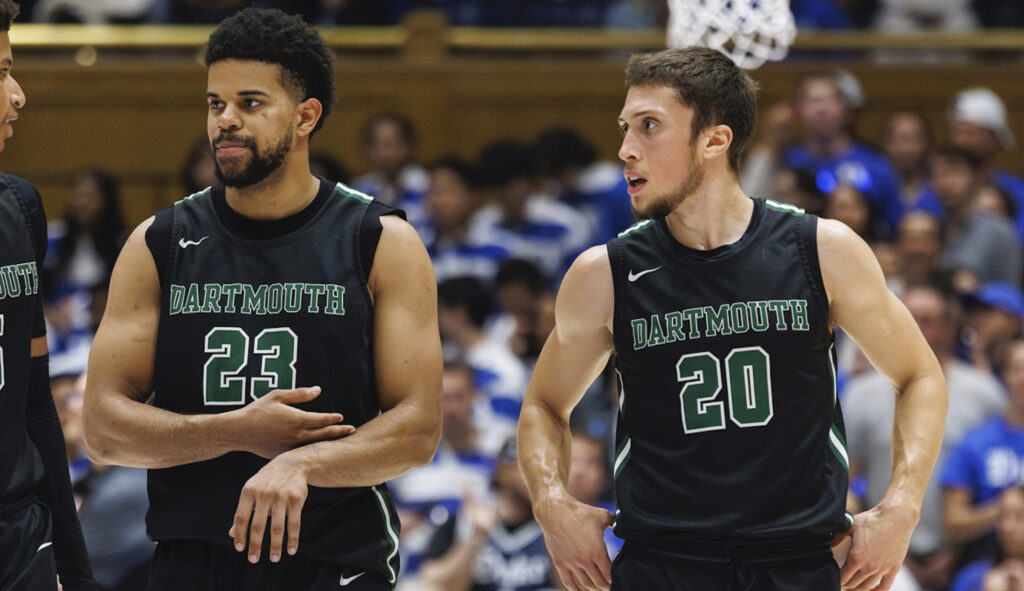The Dartmouth College men’s basketball team overwhelmingly voted to unionize, moving one step closer to being the first labor union for NCAA college athletes.
The vote was announced on Tuesday, with the 15-man roster voting 13-2 in favor of joining Service Employees International Union Local 560, which already represents other Dartmouth employees. Despite the vote, there are obstacles down the road for the team’s effort to unionize.
“Today is a big day for our team,” players Cade Haskins and Romeo Myrthil said, according to the Associated Press. “We stuck together all season and won this election. It is self-evident that we, as students, can also be both campus workers and union members. Dartmouth seems to be stuck in the past. It’s time for the age of amateurism to end.”
The players’ effort to organize started in earnest last year in September when the team decided to sign representation cards with SEIU Local 560.

A major breakthrough in the effort came last month when a regional director of the National Labor Relations Board said the team could hold a union election. The decision found that the NCAA players on the team do represent employees of the school and are thus subject to the National Labor Relations Act.
“Because Dartmouth has the right to control the work performed by the Dartmouth men’s basketball team, and the players perform that work in exchange for compensation, I find that the petitioned-for basketball players are employees within the meaning of the Act,” wrote Laura Sacks, the NLRB director for most of New England.
Despite this week’s vote, Dartmouth, which opposes the move, has the ability to appeal. A spokesperson for the college confirmed to the Washington Examiner that Dartmouth has already filed a request for review with the NLRB after the team’s vote, which is the mechanism for an appeal.
The school argues that players on the basketball team do not constitute employees and thus should not be subject to the same laws surrounding unionization.
“For decades, Dartmouth has been proud to build productive relationships with the five unions that are currently part of our campus community,” Dartmouth said in a statement. “In this isolated circumstance, however, the students on the men’s basketball team are not in any way employed by Dartmouth.
“For Ivy League students who are varsity athletes, academics are of primary importance, and athletic pursuit is part of the educational experience,” it continued. “Classifying these students as employees simply because they play basketball is as unprecedented as it is inaccurate. We, therefore, do not believe unionization is appropriate.”
In a September op-ed in the school’s newspaper, Haskins and Myrthil argued that being a student-athlete can make it difficult to achieve a work-life balance and that permitting them to join a union would put them in balance with other student employees.
“First, many of our players currently juggle part-time jobs alongside their academic and athletic commitments to help pay for their tuition and living expenses,” they wrote. “While we currently receive many forms of non-traditional compensation, these don’t pay our bills, and so we are unionizing to be compensated like other student employees, with hourly wages similar to other student wages on campus or scholarships.”
This vote marks the first time that a college team has affirmatively voted to join a union. In 2014, a union vote was held among members of the Northwestern University football team, but the ballots were sealed during an appeal and then destroyed without being counted after the appeal succeeded.
CLICK HERE TO READ MORE FROM THE WASHINGTON EXAMINER
But since 2014, a lot has changed in the NCAA and the world of college athletics, especially in the wake of a Supreme Court ruling that paved the way for student-athletes to make money off of their name, image, and likeness.
The NCAA ended its prohibition on college athletes receiving NIL compensation in 2021, and the few years since have seen an explosion in endorsement deals and a rise in athletes going to schools where they can earn the most.
